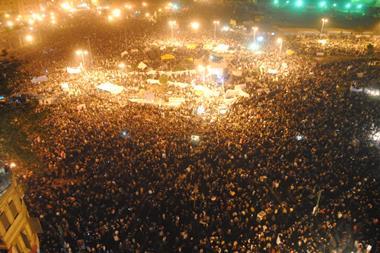The social unrest in Egypt is having a big impact on business via economic or physical disruption and reputation risks. Here's one analysts' outlook
Egypt continues to witness social, economic and political turmoil as thousands of protestors have vowed to increase the momentum of demonstrations across the country.
The “majority” demand the resignation of President Hosni Mubarak, said Maplecroft’s country risk report.
Mubarak has ruled Egypt for three decades, presiding over a regime “characterised by political oppression and high levels of corruption”, added Maplecroft.
High unemployment, which is estimated at 9.2% by the IMF but is likely to be significantly higher, has fuelled widespread resentment of the Mubarak regime. So too has the high cost of living.
So far Mubarak has refused to relinquish power. This means that the coming days, weeks and possibly months, will be fraught with multiple risks.
Maplecroft listed the following key political risks:
>>The military may be forced to abandon what is publicly seen as a neutral position if Mubarak continues to resist pressure to step down and if violence persists.
>>Unilateral intervention by the military would not guarantee a democratic future for Egypt and may trigger similar uprisings in the future.
>>Egypt is unlikely to witness a rapid return to stability if President Mubarak does resign.
>>The banned Islamist Muslim Brotherhood which has long been suppressed by the Mubarak regime may feature prominently in a post-Mubarak Egypt.
>>The potential for violent conflict is likely to pose an ongoing risk to the personnel, assets and infrastructure of companies.
>>Continuing political instability could trigger a financial crisis. The Egyptian currency has already come under increasing pressure, and confidence in the government's ability to support its banking sector is weakening.
>>The depreciation of the Egyptian pound could perpetuate inflationary pressure, causing further social disgruntlement.
>>Continued political instability will inevitably affect growth, as the markets sour and businesses struggle to operate normally.
>>Fears are increasing that traffic through Egypt's Suez Canal will be affected by the political turmoil. Any disruption to shipping through the Suez Canal would not only place the Egyptian budget under further strain but also adversely affect the price of commodities.
>>Concerns are also growing that the 220-mile Sumed oil pipeline which links the Red Sea with the Mediterranean (and pipes 1.1m barrels of oil per day) may be sabotaged by protestors or terrorists.
>>Multinational companies which operate in Egypt face serious reputational risks as the Mubarak regime attempts to exploit their assets for its own ends. This has already happened to the telecoms sector (Vodafone Group and France Telecom), which has been criticised for not taking a harder line against the government.
Maplecroft forecast
Events since protests were first launched on 25 January have mobilised the population in a hitherto unseen way. Whilst the current political stalemate has demonstrated that Egypt is not Tunisia, it has also shown the depth of public antipathy towards Mubarak and the speed with which people can mobilise. Overt opposition has forced the authorities to take a more responsive approach to public sentiment and criticism. In the long run, a drive against corruption and improved democracy will benefit Egyptian citizens and reduce the risks to businesses looking to operate in Egypt.
Nevertheless, the risks remain tangible and a relapse possible. It is incumbent on the government to match its promises of political reform with concrete actions or face continued protests. The economic risks to Egypt (food price inflation, unemployment, widespread poverty) still remain significant and a trigger for further unrest. The risk of a further spike in violence and instability will increase should Mubarak manage to cling onto power as the September 2011 presidential election date draws closer.
Investor confidence may take another blow and political instability will likely worsen should Mubarak be forced out of office before an interim government is put in place. Suleiman’s veiled threat on 9 February to impose martial law (should the Tahrir square protests continue) has hardly calmed investor concerns. Such a move would likely catalyse widespread violence and disruption.



















